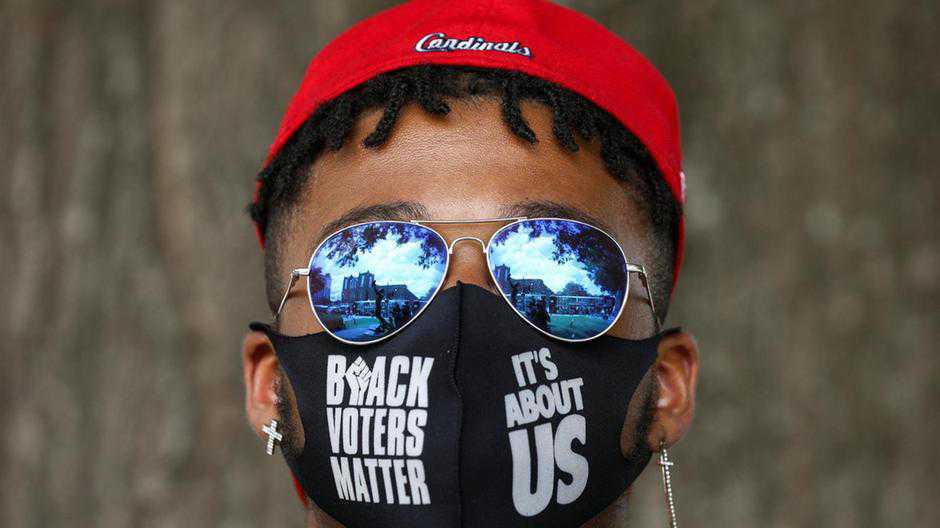US voting rights law goes nowhere as Republican states expand restrictions
23 June, 2021

Democrats in the US Congress on Tuesday failed to pass a legislative package designed to protect voting rights in the united states amid a Republican push to enact sweeping new voting laws in states they control.
The legislation didn't advance by a 50-50 party-line tie after Democrats fell short of the 60 votes had a need to pass the legislation because of a procedural mechanism in the upper chamber called the filibuster.
President Joe Biden has appointed Vice President Kamala Harris to oversee the protection of voting rights - but if this failed vote is any indication, she'll continue steadily to face an uphill battle.
“Democracy is in peril, here, in America,” the White House said in a statement supporting the legislation prior to the vote.
“The proper to vote - a sacred right in this country - is under assault with an intensity and an aggressiveness we've not seen in a long time.”
The White House statement noted the bill could have expanded “the tools open to the Justice Department to enforce the voting rights of most Americans".
“In state after state, new restrictive laws on voting and efforts to displace non-partisan election administration with partisan processes made to overturn the will of the voters have grown to be more widespread.”
Republican legislatures in at least 14 states have already enacted 22 voter restriction laws up to now this season, the Brennan Centre for Justice at the New York University School of Law said.
“In a backlash to 2020's historic voter turnout and unprecedented vote-by-mail usage, state lawmakers have imposed various significant restrictions on both mail voting and in-person voting,” the Brennan Centre wrote within an analysis of the latest crop of voting laws.
This year’s wave of legislation surpasses the prior record occur 2011, when 14 states passed 19 voting laws.
These laws, passed mainly in Republican-held states through the Obama administration, largely focused on increasing voter identification requirements regardless of the insufficient evidence that doing so would substantially prevent voter fraud.
Critics argued that the laws would hinder turnout among non-white voters who are statistically less inclined to have an acceptable type of identification.
Similarly, voting rights advocates say that the most recent crop of voter laws, described by Republicans as "election integrity" laws, would largely reduce turnout among non-white voters who overwhelmingly vote for Democrats.
Republicans have largely relied on former president Donald Trump’s baseless theories that claim widespread voter fraud in the 2020 elections as a political justification for the brand new laws.
Conversely, Senate Minority Leader Mitch McConnell derided Democrats' failed voting legislation as a "partisan power grab" on the Senate floor before the vote.
Democrats walked out of your Texas state legislature last month to deny Republicans the quorum they needed to pass an expansive new voting law, though the governor has called a particular session next month to push regulations through.
Ms Harris met with the Texas Democrats in Washington the other day to praise their walkout, which she framed as an attempt to protect the proper of Texans to vote.
“What we are seeing are examples of an attempt to hinder that right and attempt to marginalise and take from persons a right which has recently been given,” Ms Harris said at the meeting.
“What’s happening now in Texas is, of course, an extremely clear and current example of that.”
Among other activities, the Texas voting bill would curtail vote-by-mail, introduce new limits on voter registration, reduce polling spots largely employed by non-white voters and increase criminal penalties for violations of these proposed laws.
It would also ban voting before 1:00pm on Sundays, hindering black churches that traditionally drive voters to the polls after services - though Republicans now say the provision was a mistake.
Key swing states such as for example Arizona, Florida, Georgia and Michigan have passed similar laws this season.
These laws would also reduce usage of ballot drop-off locations, make it harder to vote by mail, increase voter identification requirements and curtail efforts by municipalities to shorten voter lines.
The wait time to vote in-person typically varies predicated on the racial demographics of a given locality, with white voters through the entire US usually enjoying much shorter, sometimes instantaneous wait times at the polling spots that primarily serve them.
Conversely, voting lines at in-person polling spots that mainly serve non-white communities could be notoriously long, often forcing voters to hold back in line all night to cast their ballots.
Black voters face some of the longest lines in Georgia, which in March passed the most restrictive voting laws, including a provision to create it illegal to supply food and water to voters queuing up for hours-long waits at the polls.
The Supreme Court exposed the flood gates for most of the laws to pass in 2013 when the justices voted five to four towards dismantling key provisions of the 1965 Voting Rights Act which sought to safeguard the rights of black Americans to vote after decades of racist Jim Crow-era policies severely limited their access to the polls.
Although the Voting Rights Act required certain states - largely in the south - that had upheld segregationist policies to obtain federal permission before altering their voting laws, the Supreme Court ruling eliminated this requirement.
The court’s conservative justices argued the requirement was no longer necessary since it was predicated on data that were a lot more than 40 years old.
The conservative-dominated Supreme Court is defined to rule on additional cases later this season that could further curtail the Voting Rights Act.
Source: www.thenationalnews.com
TAG(s):
